© 2014-


Radio City - History (2)
Some initial discussions did take place when it was envisaged that Radio Caroline South could be transferred to the Shivering Sands Fort, while the Mi Amigo would sail either to the north east of England or the Bristol Channel, to provide a third outlet for the Caroline network.
The outcome of these negotiations was an agreement that Project Atlanta would arrange for the installation of a 10Kw RCA transmitter on Shivering Sands which could be used to provide an improved signal should Radio Caroline South transfer to the Fort. A reconditioned and modified transmitter was obtained from radio station KCUL in Fort Worth, Texas and shipped over to Britain.
However, when the equipment was delivered to the Fort by Project Atlanta staff, it was found to be 25 years old and in such a poor condition that it failed to work properly. It also didn’t help that part of the transmitter had fallen into the sea while being hoisted onto Shivering Sands Fort. Reg Calvert engaged divers from the Folkestone and East Kent Branch of the British Sub-
Despite the set back over the transmitter some other positive agreements did come of the negotiations between Radio City and Project Atlanta which, although stopping short of a full merger, brought the two stations closer together. These included an amalgamation of the two advertising sales teams and an agreement for Radio City to relay Caroline's "Newsbeat" news service, as well as airing promotions for some Caroline South programmes. In return Project Atlanta was to pay Radio City's tendering, fuel and other day-
back over the transmitter some other positive agreements did come of the negotiations between Radio City and Project Atlanta which, although stopping short of a full merger, brought the two stations closer together. These included an amalgamation of the two advertising sales teams and an agreement for Radio City to relay Caroline's "Newsbeat" news service, as well as airing promotions for some Caroline South programmes. In return Project Atlanta was to pay Radio City's tendering, fuel and other day-
The merger of the sales teams came into effect on 1st October 1965, but was not a success. Within three months the arrangement had been terminated by Radio City amidst allegations that it was owed advertising revenue and that its tendering and other operating costs had not been paid by Project Atlanta. Radio City took back responsibility for the sale of its own airtime and payment of its operating costs with effect from 1st January 1966, while legal disputes about the money owed from the joint sales operation continued for many months afterwards. 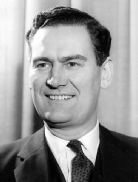
During this time Major Oliver Smedley refused to accept that Project Atlanta was no longer in partnership with Radio City and continued to approach Reg Calvert with proposals for further investment in Radio City, all of which Calvert rejected.
Meanwhile attention was turned to improving coverage for Radio City and in the Spring of 1966 professional riggers erected a new 240' aerial mast on the Shivering Sands Fort and broadcasting hours were extended to 13 hours a day.
In April 1966 Reg Calvert entered negotiations with Radio London's Managing Director, Philip Birch, proposing a merger of the two stations. The Radio London board agreed to the proposal and planned to re-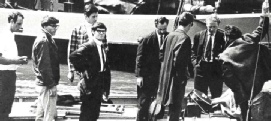 uipment on Shivering Sands.
uipment on Shivering Sands.
Nevertheless a deal was struck in May 1966 under which Radio London would manage the UKGM operation and take 55% of its advertising revenue. A new company was formed to manage UKGM -
However, the merger plans did not go ahead quite as envisaged. It came to light that Major Oliver Smedley of Project Atlanta (the original organisation behind Radio Atlanta in 1964 which also had links with Radio Caroline from July 1964 until December 1965) wanted to pursue the acquisition of Radio City and offered cash to purchase the station outright or, alternatively, the equivalent amount of shares in a joint operating company which he had formed for the purpose -
Plans for the launch of UKGM were first made public in a newspaper article on 16th June 1966. Oliver Smedley, hearing for the first time of this agreement between Radio London and Radio City, feared that he was being double crossed by Reg Calvert and that his Project Atlanta transmitter on Shivering Sands (which had never worked satisfactorily) would be put to use by the new easy-
On Saturday 18th June 1966 Smedley hurriedly arranged a boarding party (mainly of striking seamen) to go out to Shivering Sands Fort to recla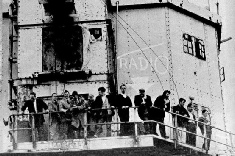 im his transmitter The boarding party, accompanied by Smedley and Kitty Black (another of the original Project Atlanta shareholders) left Gravesend Pier just before midnight on Sunday 19th June 1966, arriving at the Fort some three hours later.
im his transmitter The boarding party, accompanied by Smedley and Kitty Black (another of the original Project Atlanta shareholders) left Gravesend Pier just before midnight on Sunday 19th June 1966, arriving at the Fort some three hours later.
On Shivering Sands Fort Radio City had closed for the day and the seven broadcasting and engineering staff were all asleep as Smedley, Black and the boarding party of seventeen hired men scrambled onto the structure, successfully occupying it and meeting no resistance 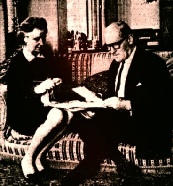 whatsoever. Smedley and Black then removed the transmitter crystal and
whatsoever. Smedley and Black then removed the transmitter crystal and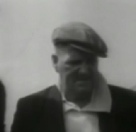 returned with it to Gravesend, leaving the remainder of the boarding party in occupation of Shivering Sands and the Radio City staff locked in their quarters unable to put their station on air as usual at 6.00am on Monday 20th June 1966.
returned with it to Gravesend, leaving the remainder of the boarding party in occupation of Shivering Sands and the Radio City staff locked in their quarters unable to put their station on air as usual at 6.00am on Monday 20th June 1966.

The boarding party in occupation at Shivering Sands Fort, June 1966

Click on picture to enlarge
Radio Caroline’s Newsbeat, broadcast by Radio City

Radio London’s Managing Director, Philip Birch
Kitty Black and Major Oliver Smedley

The Times 25th June 1966
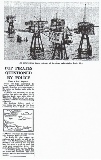
The Times 23rd June 1966
The team from Radio London preparing to visit Shivering Sands Fort, June 1966
Daily Express
22nd September 1965

Alf Bullen, leader of the boarding party

History
Key Dates
Fort and Location
Technical
Staff
Programmes





Treasure Chest





Back to Britain Gallery


Back to Radio City

A film made by DJ Leon Tippler during his time on Radio City. The film provides an interesting insight into life aboard Shivering Sands Fort.
(The film was found in Leon's archives after he died.)